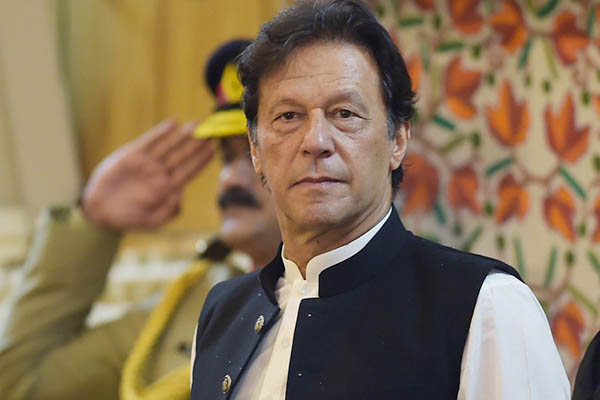
File photo of Prime Minister Imran Khan. Aamir Qureshi—AFP
In editorial, Pakistan’s prime minister stresses that peaceful Afghanistan is in the best interests of his country
Prime Minister Imran Khan on Saturday urged all stakeholders to the Afghanistan peace process to resist the urge for unrealistic timelines, saying any “hasty withdrawal” would be unwise.
“A hasty international withdrawal from Afghanistan would be unwise. We should also guard against regional spoilers who are not invested in peace and see instability in Afghanistan as advantageous for their own geopolitical ends,” he wrote in an editorial published by The Washington Post, adding that after the first steps taken in Doha, abandoning the peace talks at this stage would be a great travesty.
Noting that the peace process was likely to be difficult, the prime minister advised patience and compromise. “Progress could be slow and painstaking; there may even be the occasional deadlock, as Afghans work together for their future. At such times, we would do well to remember that a bloodless deadlock on the negotiating table is infinitely better than a bloody stalemate on the battlefield,” he said, adding that Pakistan would continue supporting the Afghan people’s quest for a unified, independent and sovereign Afghanistan.
Khan said that Pakistan believed peace talks should not be held under coercion and urged all parties to reduce violence, adding that now that Kabul had recognized the Taliban as a political reality, hopefully the insurgents would recognize the progress Afghanistan had made.
“Like the United States, Pakistan does not want to see Afghanistan become a sanctuary for international terrorism ever again,” he said, noting that over 80,000 Pakistani lives had been lost in the war on terror since the events of 9/11. Even now, he said, Pakistan continued to be targeted by terrorist groups based in Afghanistan, posing a clear danger to global peace.
“We hope the Afghan government will take measures to control ungoverned spaces inside its territory from where terrorist groups are able to plan and carry out attacks against the Afghan people, the international coalition forces stationed in Afghanistan, and other countries in the region, including Pakistan,” he wrote.
Future plans
In his editorial, the prime minister also advised planning for a post-war Afghanistan. He said focus should be on creating conditions that enable Afghan refugees to return to their homeland with dignity and honor. He noted that Pakistan had hosted over 4 million Afghan refugees.
“Guns and drugs have also flowed into our country. The wars have disrupted our economic trajectory and radicalized fringes of our own society. The Pakistan I had known growing up in the 1960s and 1970s changed in some deeply unsettling ways,” he said, claiming this had taught him that Pakistan was too closely intertwined with the neighboring nation to not be affected by events there.
“We realized Pakistan will not know real peace until our Afghan brothers and sisters are at peace. We also learned that peace and political stability in Afghanistan could not be imposed from the outside through the use of force. Only an Afghan-owned and Afghan-led reconciliation process, which recognizes Afghanistan’s political realities and diversity, could produce a lasting peace,” he said, adding that it was heartening that Washington and Islamabad agreed on this.
For Pakistan, the prime minister said, regional peace and stability remained key “to realizing the collective aspirations of our people for a better future. We are committed to multilateral collaboration to achieve this.”
Noting that the path to peace had not been easy, the prime minister said it had been achieved “thanks to the courage and flexibility that were on display from all sides.”
In conclusion, he wrote, “my vision for Pakistan prioritizes development and prosperity for my country and our region through connectivity and economic diplomacy.”
